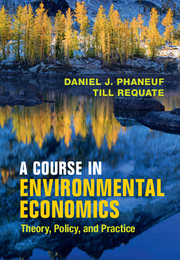Book contents
- Frontmatter
- Dedication
- Contents
- Figures
- Tables
- Preface
- Notational Conventions
- PART I ECONOMICS AND THE ENVIRONMENT
- PART II THE DESIGN OF ENVIRONMENTAL POLICY
- PART III VALUING THE ENVIRONMENT
- PART IV THE PRACTICE OF ENVIRONMENTAL ECONOMICS
- 21 Cost- Benefit Analysis: Modeling
- 22 Cost- Benefit Analysis: Empirical
- 23 Final Thoughts
- References
- Author Index
- Subject Index
23 - Final Thoughts
from PART IV - THE PRACTICE OF ENVIRONMENTAL ECONOMICS
Published online by Cambridge University Press: 27 February 2023
- Frontmatter
- Dedication
- Contents
- Figures
- Tables
- Preface
- Notational Conventions
- PART I ECONOMICS AND THE ENVIRONMENT
- PART II THE DESIGN OF ENVIRONMENTAL POLICY
- PART III VALUING THE ENVIRONMENT
- PART IV THE PRACTICE OF ENVIRONMENTAL ECONOMICS
- 21 Cost- Benefit Analysis: Modeling
- 22 Cost- Benefit Analysis: Empirical
- 23 Final Thoughts
- References
- Author Index
- Subject Index
Summary
Via the 22 previous chapters in this book we have tried to tell the story of environmental economics, beginning with its roots in neoclassical welfare theory and the environmental movements of the 1960s, and through to the sophisticated theoretical and applied research that today defines the field. We have attempted to integrate in a single volume the conceptual, empirical, and policy aspects of the field, without compromising on the depth of coverage. This, more than anything, explains the length of the book and the amount of time it has taken to write. Even with this, there are many topics that deserve discussion which we have elected not to cover in the book. In this chapter we will briefly discuss some of the important omissions and offer some closing thoughts.
We begin in the next section by noting that environmental economics, like many other fields in microeconomics, has experienced a flowering of empirical research. This is due to several simultaneously occurring factors, including greater appreciation for careful applied work in the economics profession, advances in applied econometric methodology, and the increased availability of high-quality behavioral and environmental data. Many of the questions being pursued do not fit cleanly into the standard canon of the field, which has served as the organizing principle of the book. To highlight this increasingly important aspect of the field, in section 23.1 we summarize a handful of recent papers that illustrate the range of empirical research questions that have occupied environmental economists.
In addition to specifically empirical topics, there are several other areas that we have not covered or have discussed only briefly. Examples include the large economic literature on climate change, topics at the nexus of energy and environmental economics, and political economy/environment issues related to interest group activities, alternative regulator objective functions, and voting. We have also omitted traditional resource economics, and topics that combine elements of environmental policy and natural resource management. In section 23.2 we catalog these topics, discuss their omission in the context of the book's organization and intent, and provide references for further reading.
- Type
- Chapter
- Information
- A Course in Environmental EconomicsTheory, Policy, and Practice, pp. 705 - 718Publisher: Cambridge University PressPrint publication year: 2016



